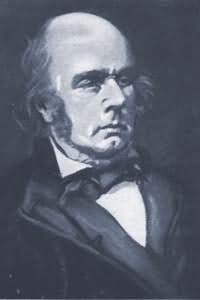 Born in 1809 in Bredfield, England, Edward FitzGerald was a poet and writer and is perhaps most famous for his translation of the Persian work The Rubáiyát of Khayyám. He was raised in a wealthy family and spent part of his youth in Paris before attending school in Bury St Edmunds and then going onto Cambridge University in 1826.
Born in 1809 in Bredfield, England, Edward FitzGerald was a poet and writer and is perhaps most famous for his translation of the Persian work The Rubáiyát of Khayyám. He was raised in a wealthy family and spent part of his youth in Paris before attending school in Bury St Edmunds and then going onto Cambridge University in 1826.
FitzGerald made friends with the likes of Tennyson and Thackeray who were part of the Cambridge Apostles but he was never invited to join the group, perhaps because he never really saw himself as a serious poet. Unlike many of his contemporaries, FitzGerald did not have to work for a living and he moved to Wherstead in Suffolk where he stayed until around 1835 when he moved again to live at Woodbridge.
At the time, he was interested in reading the literature of the day, studying languages, and discovering science but he had no real inclination towards writing until he was in his 40s and published his first work Euphranor, which harked back to his days at Cambridge. He had been studying the poetry of Spain and, after a chance meeting with Professor Edward Cowell, began to take an interest in the work of Persia poets. In 1853 he translated the Six Dramas of Calderón and published a few of his own works anonymously but he was a ponderous writer given to procrastination.

It was in 1857 that FitzGerald was sent a copy of the works of Persian poet Omar Khayyám and a short time later he produced a translation of The Rubáiyát of Omar Khayyám in pamphlet form. At first it didn’t seem to make much of a splash but when poets Rossetti and Swinburne read the work and spread the word it began to gather greater success.
Omar Khayyám was a poet and mathematician who lived in Persia between 1048 and 1127 and who adhered closely to the work of astronomer and philosopher Avicenna. When he was shunned by the royal court, Khayyám turned to writing and produced his quatrains that were made up of self-contained four line verses. FitzGerald in fact did not create a literal translation of the work but took the general idea and made it more readable for his contemporaries.
In 1868 FitzGerald published a second, updated version of the Rubáiyát and he also worked on translations of Oedipus. In 1861 he had turned his talents to the sea and bought a yacht which was christened The Scandal. It perhaps reflected his personal life which was often complex. When he was younger, he entered into an ill-conceived marriage with Lucy Barton which lasted just a couple of months, probably due to FitzGerald’s sexuality.

In his later life, FitzGerald fell out with Christianity and stopped going to church, spending his time either sailing or reading books in his home in Lowestoft. He was happy to be an idler and preferred the company of his friends rather than working at anything. He died in 1883 at the age of 74 and was buried in the Suffolk parish of Boulge.

